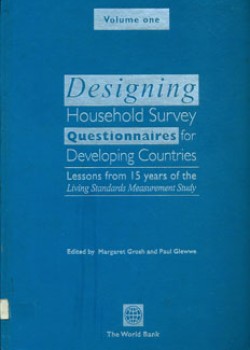
Designing Household Survey Questionnaires for Developing Countries
Lessons from 15 Years of the Living Standards Measurement Study - Volume One
Editor: Grosh, Margaret and Glewwe, Paul.
Publisher: The World Bank (WB)
Place of Publish: USA, Washington D.C.
Year: 2000
Page Numbers: 338
Acc. No: 980
Class No: 001.42 DES
Category: Books & Reports
Subjects: Research Methods
Type of Resource: Monograph
Languages: English
ISBN: 0-19-521595-8
Multi-topic household surveys have become an indispensable instrument for understanding development and are fundamental to serious microeconomic analysis. They are used to test behavioural theories, to assess public interventions and to locate the poor. Developing countries without adequate household survey data are forced to make policy decisions in an environment with many blind spots, where crucial information can be seen only dimly or not at all. Household surveys are essential for the analysis of most policy issues. This book has carefully assessed recentexperience and developed today,s best-practice technique for household surveys. Indeed, much of this techniquewas developed and pioneered by the authors.This book is clear, systematic, and well structured. It is also wise andscholarly. It will be indispensable to anyone involved in carrying out or analysing household surveys, and thus, itis required reading for all those who wish to take evidence seriously, when they think about policy. The value of a household survey, though, ultimately depends on its design and execution. This volume provides advice on how to design multi-topic surveys - single surveys collecting data on many different topics. The surveys treated in this book include: household size and composition, education, health, anthropometry, fertility, income and consumption, employment, agricultural production, household enterprises, transfers and non-labour income, savings and credit, housing, the environment, migration and time use. The handbook covers key topics in the design of household surveys, with many suggestions for customizing surveysto local circumstances and improving data quality. Detailed draft questionnaires are provided in written andelectronic format, to help users customize surveys.



